
Nicholas Aloysius Kenny (February 3, 1895 in Astoria, New York - December 1, 1975 in Sarasota, Florida) was a syndicated newspaper columnist, a song lyricist and a poet who wrote light verse in the Edgar Guest tradition.

Nicholas Aloysius Kenny (February 3, 1895 in Astoria, New York - December 1, 1975 in Sarasota, Florida) was a syndicated newspaper columnist, a song lyricist and a poet who wrote light verse in the Edgar Guest tradition.
Born in Queens, Kenny attended high school for only three months before joining the Navy (1911–18), serving on the USS Arizona, followed by a tour of duty in the Merchant Marine (1918–20). He enlisted in the navy in April 1917 and was discharged in November 1918 as a Yeoman 2nd Class. [1] He continued his education with extensive reading in ships' libraries. He began writing poetry but did not sign his poems until one was published in Arthur Brisbane's column.
While a sportswriter and rewrite man at the Bayonne Times (1920–23), he wrote his first column, "Getting an Earful" (later collected in a 1932 book). After a brief period at the Boston American (1923–24), Kenny moved on to the New York Journal (1924–27) and the New York Daily News (1927–30). He was the radio editor at the New York Daily Mirror , and in 1930, he began writing "Nick Kenny Speaking," a column combining verse, jokes and observational humor with his commentary on current radio programs. The popularity of the column kept him at the New York Daily Mirror until that paper shut down in 1963. At that point, he moved to Sarasota, Florida where he wrote a column for the Sarasota Herald Tribune until his death.
When the USS Arizona went down at Pearl Harbor, one of Kenny's poems was on the ship's bulletin board. Kenny is mainly remembered today as the lyricist of the 1931 popular song standard, "Love Letters in the Sand", a 1957 gold record hit for Pat Boone. Kenny's next big success, "Gold Mine in the Sky," inspired the Gene Autry movie, Gold Mine in the Sky (1938) and enabled Kenny and his brother Charles to launch their own music firm, Gold Mine in the Sky Publishing Company. His songs included "Gone Fishin'" and "Scattered Toys" recorded by The Three Suns, which has lyrics somewhat similar to one of his "Patty Poems".
During the mid-1930s he was the host of The Nick Kenny Radio Hour which sometimes featured the song-and-dance team of Jacqueline and William Daniels (who grew up to become the Screen Actors Guild President in 1999-2001). In 1934, the Three X Sisters, a popular radio harmony trio were part of his "Radio Scandal's" scripted radio act. Delores Hawkins (1927–87) was the vocalist on Nick Kenny's Children's Follies.
Kenny was a guest on various radio programs between 1939 and 1952, including What's My Name?, Finders Keepers, Music for Millions and The Billion Dollar Show, a 1952 program celebrating the 30th anniversary of broadcasting. He also contributed scripts and poems to Mutual's Family Theatre.
On NBC television, Kenny had his own 15-minute music and talk show, The Nick Kenny Show (1951–52) with cast members Irene Walsh and Don Tippen.
Kenny published several collections of his poems between 1929 and 1959. In addition to poems, the collection Day Unto Day (1943) also featured quotations in "Uncle Nick's Scrap Book," plus tributes to Kenny by Major Edward Bowes, Uncle Don, Ted Malone, Elsa Maxwell and Kate Smith. The poems in this book were grouped into sections, including Human Interest Poems, Personality Poems, Sailor Poems, Patty Poems and Joy Poems. The latter two were about his daughters, Patty and Joy, who were ages 15 and 11, respectively, at the time the book was published.
The illustrator Richard Bassford has long had an interest in Kenny's work and has illustrated Kenny poems in recent years.

Alan Jay Lerner was an American lyricist and librettist. In collaboration with Frederick Loewe, and later Burton Lane, he created some of the world's most popular and enduring works of musical theatre both for the stage and on film. He won three Tony Awards and three Academy Awards, among other honors.

The Philadelphia Experiment was an alleged event claimed to have been witnessed by an ex-merchant mariner named Carl M. Allen at the United States Navy's Philadelphia Naval Shipyard in Philadelphia, Pennsylvania, United States, sometime around October 28, 1943. Allen described an experiment where the U.S. Navy attempted to render invisible the destroyer escort USS Eldridge and the bizarre results that followed.

The Andrews Sisters were an American close harmony singing group of the swing and boogie-woogie eras. The group consisted of three sisters: contralto LaVerne Sophia, soprano Maxene Anglyn, and mezzo-soprano Patricia "Patty" Marie. The sisters have sold an estimated 80 million records. Their 1941 hit "Boogie Woogie Bugle Boy" can be considered an early example of jump blues. Other songs closely associated with the Andrews Sisters include their first major hit, "Bei Mir Bist Du Schön " (1937), "Beer Barrel Polka " (1939), "Beat Me Daddy, Eight to the Bar" (1940), "Don't Sit Under the Apple Tree " (1942), and "Rum and Coca Cola" (1945), which helped introduce American audiences to calypso.

Edgar Yipsel Harburg was an American popular song lyricist and librettist who worked with many well-known composers. He wrote the lyrics to the standards "Brother, Can You Spare a Dime?", "April in Paris", and "It's Only a Paper Moon", as well as all of the songs for the film The Wizard of Oz, including "Over the Rainbow". He was known for the social commentary of his lyrics, as well as his leftist leanings. He championed racial and gender equality and union politics. He also was an ardent critic of religion.

Harry Warren was an American composer and the first major American songwriter to write primarily for film. He was nominated for the Academy Award for Best Original Song eleven times and won three Oscars for composing "Lullaby of Broadway", "You'll Never Know" and "On the Atchison, Topeka and the Santa Fe". He wrote the music for the first blockbuster film musical, 42nd Street, choreographed by Busby Berkeley, with whom he would collaborate on many musical films.

Edgar Albert Guest was a British-born American poet who became known as the People's Poet. His poems often had an inspirational and optimistic view of everyday life.
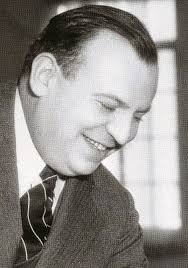
Alexander Dubin was an American lyricist. He is best known for his collaborations with the composer Harry Warren.
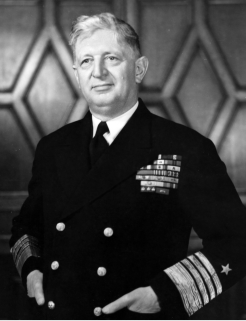
Henry Kent Hewitt was the United States Navy commander of amphibious operations in north Africa and southern Europe through World War II. He was born in Hackensack, New Jersey and graduated from the United States Naval Academy in 1906.
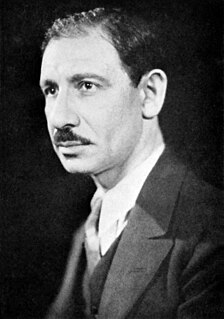
Franklin Pierce Adams was an American columnist known as Franklin P. Adams and by his initials F.P.A.. Famed for his wit, he is best known for his newspaper column, "The Conning Tower", and his appearances as a regular panelist on radio's Information Please. A prolific writer of light verse, he was a member of the Algonquin Round Table of the 1920s and 1930s.
Victor Mizzy was an American composer for television and movies and musician whose best-known works are the themes to the 1960s television sitcoms Green Acres and The Addams Family. Mizzy also wrote top-20 songs from the 1930s to 1940s.
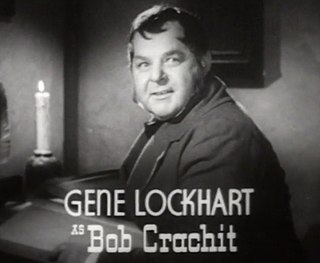
Edwin Eugene Lockhart was a Canadian-American character actor, playwright, singer and lyricist. He became an American citizen in 1939.
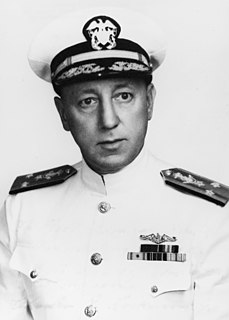
Charles Andrews Lockwood was a vice-admiral and flag officer of the United States Navy. He is known in submarine history as the commander of Submarine Force Pacific Fleet during World War II. He devised tactics for the effective use of submarines, making the members and elements of "silent service" key players in the Pacific victory.

Christopher Vernon Hassall was an English actor, dramatist, librettist, lyricist and poet, who found his greatest fame in a memorable musical partnership with the actor and composer Ivor Novello after working together in the same touring company. He was also a noted biographer of Rupert Brooke and Edward Marsh.
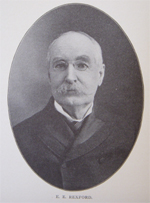
Eben Eugene Rexford was an American writer and poet, and author of lyrics to popular and gospel songs.

Guy Edward John Garvey is an English musician, singer, songwriter and BBC Radio 6 Music presenter. He is the lead singer and lyricist of the rock band Elbow.
Charles Francis Kenny was an American composer, lyricist, author, and violinist. His hit songs include "There's a Gold Mine in the Sky", "Love Letters in the Sand", "Laughing at Life", and "Because It's Your Birthday Today", all of which were written with his brother Nick Kenny. The birthday song appeared in the Our Gang episode Practical Jokers.

Ernest Hemingway (1899–1961) was an American novelist, short-story writer, journalist, and sportsman. His economical and understated style—which he termed the iceberg theory—had a strong influence on 20th-century fiction. Many of his works are considered classics of American literature.

Anupam Roy is an Indian singer, singer-songwriter, music director, composer, songwriter, guitarist, playback singer from Kolkata, West Bengal. He made his debut with Amake Amar Moto Thakte Dao & Benche Thakar Gaan, which appeared on the soundtrack of the 2010 Bengali film Autograph. Since then, he has gone on to compose, write lyrics and sing for many Bengali films. In 2015, he made his Bollywood debut, composing the songs and score for Piku. He was nominated for the 61st Filmfare Award for Best Music Director, and won the 61st Filmfare Award for Best Background Score for Piku. He is a recipient of 64th National Film Award for Best Lyrics for the song Tumi Jaake Bhalobasho.

Gold Mine in the Sky is a 1938 Western film directed by Joseph Kane and starring Gene Autry, Smiley Burnette, and Carol Hughes. Based on a story by Betty Burbridge, the film is about a singing cowboy and ranch foreman who, as executor of the owner's will, must see that the daughter and heiress does not marry without his approval.
Bhupal Rai is a poet, lyricist, writer and editor. He has voiced for the rights of the marginalised people through his writings. His writings carry the organic essence of the Kirati people and their culture. His writings carry the blend of Marxist philosophy and socio-cultural pragmatism of the indigenous people.